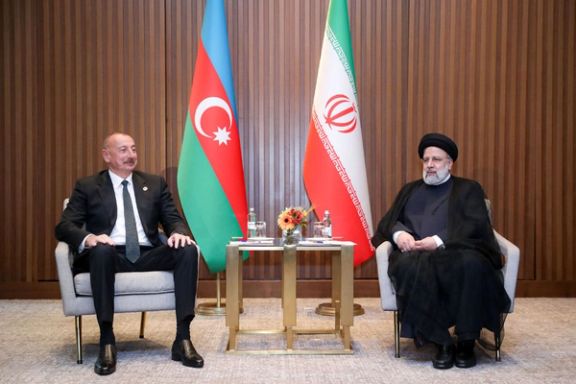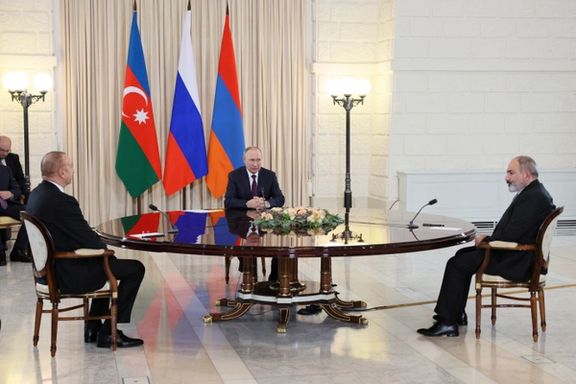Azeri President Launches Broadside Against Iran

Iran is dangerously implicated in regional tensions centered on Azerbaijan-Armenia that are exacerbated by fall-out from Russia’s war in Ukraine.

Iran is dangerously implicated in regional tensions centered on Azerbaijan-Armenia that are exacerbated by fall-out from Russia’s war in Ukraine.
Citing Interfax Friday, Iran’s semi-official news agency ISNA reported that Azerbaijan’s President Iham Aliyev cancelled a December 7 meeting in Brussels with Armenian Prime Minister Nikol Pashinyan aimed at easing tensions after September-October clashes killed around 200 Armenian and 80 Azerbaijani soldiers.
Earlier Friday, at a Baku conference ‘Along the Middle Corridor,’ Aliyev launched a broadside against Iran, his toughest so far since relations soured over Iran’s role in the 2020 Azerbaijan-Armenia war, when adjacent Iranian military exercises followed the Azerbaijanis capturing areas around the disputed Nagorno-Karabagh enclave and along the Iran border.
Stepping Friday on ground he previously avoided, Aliyev said his government would do “our best to preserve our secular lifestyle…as well as Azerbaijanis living in Iran,” whom he called “part of our people.” The president said that in Azerbaijan 340 schools taught in Russian and ten in Georgian, while none in Iran taught in Azeri. Around a quarter of Iran’s population is Azari, with analysts and activists disagreeing over the closeness of their cultural-linguistic links to their neighbors to the north.
“We worked with three presidents of Iran, [Mohammad] Khatami, [Mahmoud] Ahmadinejad, and [Hassan] Rouhani,” Aliyev said. “For all these years there was no situation similar to the current one. Never has Iran had two military exercises near our borders within a few months. There have never been such hateful and threatening statements against Azerbaijan.”
‘Hateful statements’ referred to warnings from President Ebrahim Raisi and other leaders against any border changes or threats to Iran’s transit route to Armenia, which is vulnerable since 2020 changes. Iran carried out more military drills along the border October, when Foreign Minister Hossein Amir-Abdollahian also visited Yerevan.

But Tehran-Baku tensions have simmered since the 2020 war, when Iran moderated its past support for mainly Christian Armenia due partly to domestic pressures from both ethnic Azeri and Shia clerics supporting fellow Muslims.
Brussels mediation meeting cancelled?
Armenia’s frustration at what they feel is a lack of support from Russia – which has been engrossed in the Ukraine war – lay behind the news early Friday that Pashinyan had involved French President Emmanuel Macron as a possible mediator to build on the current ceasefire.
This prompted Aliyev’s announcement refusing a French role – and Kremlin spokesperson Dmitry Peskov to immediately offer Moscow’s support as a broker.
Analysts generally see the Azerbaijan-Armenia balance tilting in Baku’s favor since 2020. This has come with Aliyev making statements seen as provocative in Tehran. On November 11, at a summit of Turkic states of central Asia, the president said the “geographical borders of the Turkic world are wider than the Turkic states.” In Baku, state media has recently referred to north-western Iran, where most Iranian Azari live, as ‘south Azerbaijan.’
‘Persian fascist mullah regime’
Mahmudali Chehregani, Washington-based leader of the South Azerbaijan National Awakening Movement, appeared on Azerbaijani state television November 4 to promise the end of the “Persian fascist mullah regime.” Once considered persona not grata in Baku, Chehregani has lately criticized relations between Tehran and Yerevan, the “enemy of Azerbaijanis,” and said that an Armenian consulate due in Tabriz would be “razed to the ground.”
Iran’s options are limited. In mid-November, it summoned ambassador Ali Alizadeh over “unfriendly statements” by leading Baku officials, referring for example to Aliyev November 8 warning Iran, indirectly, against further military exercises.
While Iran’s main concern is fragile land corridor to Armenia – and fears a move to connect Turkey with mainland Azerbaijan and on to central Asia – it may also see Aliyev as exploiting protests in Iran. Such edginess might explain an Iranian suggestion of Azerbaijani involvement in the October 26 attack in Shiraz claimed by the Islamic State group (Isis-Daesh).
Raisi is unlikely, as yet, to take the advice from some commentators, including Shargh newspaper November 12, to downgrade relations with Baku or introduce trade sanctions. But Iran’s recent targeting of Iranian Kurdish groups in northern Iraq may be in part a message to Baku.
Ceyhun Sadlinski at a conference organized by Azerbaijan’s Security Council, where he is first deputy chairman, said Thursday Iran’s “special services are actively carrying out intelligence and subversive activities” against Baku, the official Azerbaijani Press Agency reported. “Drastic measures” were being taken in response, Sadlinski said.